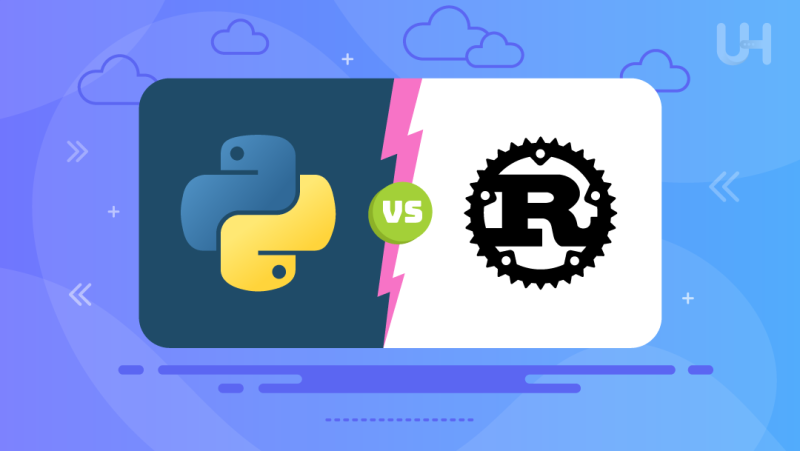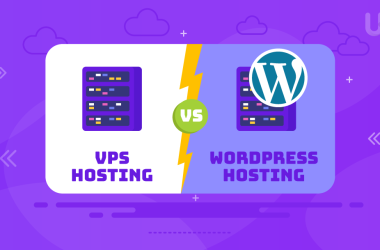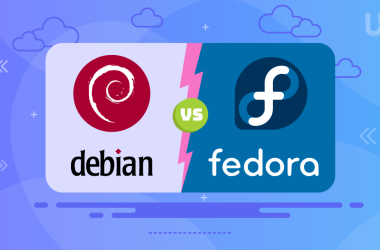Among modern leading programming languages, Rust and Python represent complementary choices for a project. Rust vs Python, both languages already have their niches in development, offering unique advantages in different use cases. Understanding the relative strengths and weaknesses of each is important in determining which will best suit your project’s needs.
In this article, we will discuss a few key features of Rust vs Python, their pros and cons, and typical field use. We will then give a head-to-head comparison that will help you decide which one best suits your developmental goals, whether you need Rust’s raw power or Python’s versatility.
What is Rust?
Rust is a new systems programming language designed to provide memory safety and features that can be performed efficiently but never at the cost of speed. Mozilla developed it and launched it in 2010, mainly aimed at resolving issues such as memory leaks and thread safety, which are commonly seen in languages like C and C++. The reason it does so is by enforcing strict rules related to ownership. Therefore, Rust is considered the best option for low-level programming tasks where one wants total control over system hardware resources.
The key philosophy underlying Rust’s design is performance, reliability, and concurrency. It is designed to help developers write secure, high-performance software without having to worry about the common pitfalls of memory management. Its strict compiler checks ensure that Rust programs are efficient and safe, hence its popularity in systems programming, game development, and blockchain technologies.
Key Features
- Memory safety without garbage collection
- Zero-cost abstractions (abstractions that don’t impact runtime performance)
- Ownership system (prevents memory leaks)
- Concurrency without data races
- Strong static typing
Pros
- High performance: Rust is on par with C++ in terms of speed.
- Memory safety: Rust’s ownership model prevents common errors like null pointer dereferencing and data races.
- Concurrency: Provides advanced control over thread management and safe concurrency.
- Active community and growing ecosystem: Regular updates and improvements.
- Ideal for system-level programming: Rust is excellent for writing low-level code with high-level safety guarantees.
Cons
- Steep learning curve: The ownership system can be hard to master.
- Slower development: Writing in Rust often takes longer compared to high-level languages like Python.
- Less mature libraries: Although growing, Rust’s ecosystem is still not as vast as Python’s.
Use Cases
- Systems programming: Ideal for operating systems, browser engines, and embedded systems.
- Blockchain development: Rust is popular for building secure blockchain platforms.
- Game development: Used for developing high-performance games, especially when combined with Gaming VPS for better scalability and latency management.
- WebAssembly: Rust compiles to WebAssembly, making it useful for web development.
- Performance-critical applications: Rust excels in situations where both speed and safety are paramount.
What is Python?
Python is an interpreted high-level programming language developed since the late 1980s. The language is supposed to be easily understandable and simple, with simplicity and readability features. Furthermore, it is also among the highest-ranked languages in the world. Especially in web development, data science, artificial intelligence, and automation, it ranks owing to its diverse front-end libraries and frameworks.
Python can handle projects as small as a single script up to a complex machine-learning model. Its simplicity reduces the learning curve and makes it an excellent language to start with. Python’s dynamic typing and interpreted nature make writing and executing code fast and easy. However, this usually comes at the cost of not being performant compared to other languages compiled otherwise, like Rust.
Key Features
- Dynamic typing and easy syntax
- Interpreted language (no need to compile code)
- Extensive standard library (libraries for almost everything)
- Cross-platform compatibility
- Large ecosystem for AI, data science, and web development
Pros
- Easy to learn and use: Python uses a few words in syntax, making it the best system for beginners.
- Extensive libraries: Python has a library for almost any use case, ranging from machine learning-incorrect TensorFlow and PyTorch to web development tools using Django and Flask.
- Great for rapid prototyping: Because of the simplicity of Python, it allows for quick iterations and testing.
- Strong community support: Python enjoys one of the largest developer communities.
- Versatility: Python is a versatile language and full-service provider that can be applied to web development, data science, automation, and cross-site scripting, among many other things.
Cons
- Slower execution: Python, an interpreted language, is slower than a compiled language like Rust.
- Inefficiency of Memory: Python is a hungry language and, therefore, unsuitable for memory-critical systems.
- It is not ideal for mobile and high-performance applications: Although Python can indeed be applied in many areas, it may not be the best choice for resource-intensive or low-level programming.
Use Cases
- Web Development: Generally, people use Python because of frameworks like Django and Flask.
- Data Science and Machine Learning: Normally used for data analysis, scientific computing, and AI.
- Automation and scripting: Excellent for automation scripts.
- Prototyping: Python is very good when you should develop something fast or try an idea.
- DevOps: DevOps pipeline automation commonly makes use of it.
Optimize Your Python Projects with Reliable Hosting!
Are you looking to deploy your Python applications seamlessly? UltaHost offers optimized Python hosting that provides the speed, flexibility, and support you need for your development environment.
Python vs Rust: Head-to-Head Comparison
While both Rust vs Python are powerful, they cater to different types of projects. Below is a comparison of key differences between Rust and Python:
| Aspect | Rust | Python |
| Performance | High-performance, comparable to C++ | Slower due to interpreted nature |
| Memory Management | Manual but safe through an ownership model | Automatic via garbage collection |
| Concurrency | High-level control over concurrency | Concurrency support, but not as robust |
| Ease of Learning | Steeper learning curve | Easy to learn and widely taught |
| Ecosystem | Growing but smaller ecosystem | Extensive ecosystem, especially for data |
| Compilation | Compiled language | Interpreted language |
| Use Cases | Systems programming, game development | Web development, data science, AI, scripting |
| Syntax | Complex but powerful | Simple and readable |
Rust vs Python: Which One Should You Choose?

Ultimately, a decision between Rust and Python depends on the nature of your project and how much performance is needed from your code. None outclasses the other; instead, each has different strengths and weaknesses.
Rust
Use Rust for cases like:
- System-level programming: When a fine granularity of control is required over memory and performance.
- High-Performance Applications: This is especially good for high-intensity, high-speed, high-efficiency programs like game engines and real-time applications. Due to its speed and memory safety, it is also used to create high-performance gaming servers.
- Blockchain: For secure and fast blockchain development.
- Concurrency-heavy jobs: When working on multi-threaded applications needing concurrency with no data races.
Python
Use Python for cases like:
- Web development: Python, with its Django or Flask frameworks, is the right fit for dynamic websites.
- Data Science and Machine Learning: The libraries of Python make it the hottest choice for data analysis, AI, and Scientific Computation.
- Prototyping: Python is simple to learn, and thus, one can quickly develop and test an idea.
- Automation: Provides the best environment to script and automate repetitive tasks in software development or system administration.
Conclusion
In deciding to choose between the languages Python or Rust for your particular needs, you should look at the specific requirements of the job and the constraints. Rust fits very well in use cases where high performance, memory safety, and concurrency are critical. Python’s strong points are its versatility, ease of learning, and huge library collection, making it perfect for rapid web application and data science development. Both languages have their place in modern software development, and your choice should be per the goals of your project.
For developers looking to balance performance with ease of management, UltaHost’s managed VPS hosting is perfect. Whether you’re working with Python or Rust, you can focus on building your applications while we handle the rest.
FAQ
Can Rust and Python be used together?
Yes, you can integrate Rust with Python using tools like PyO3 or Rust’s FFI to utilize Rust’s performance in Python applications.
What are popular frameworks for Rust?
Popular Rust frameworks include Actix for web apps and Rocket for building fast, secure APIs.
Is Python good for mobile app development?
While not the primary choice, Python can be used for mobile apps with frameworks like Kivy and BeeWare.
How does Rust handle errors?
Rust uses Result and Option types for error management, promoting safe and explicit handling without exceptions.
Can Python be used for game development?
Yes, Python can be used for game development with libraries like Pygame for creating 2D games.
What is the learning curve for Rust vs Python?
Rust has a steeper learning curve due to its syntax and ownership model, while Python is known for its readability and ease of use.
Are there performance benchmarks for Rust and Python?
Yes, benchmarks show Rust significantly outperforms Python in execution speed, especially for CPU-intensive tasks.












